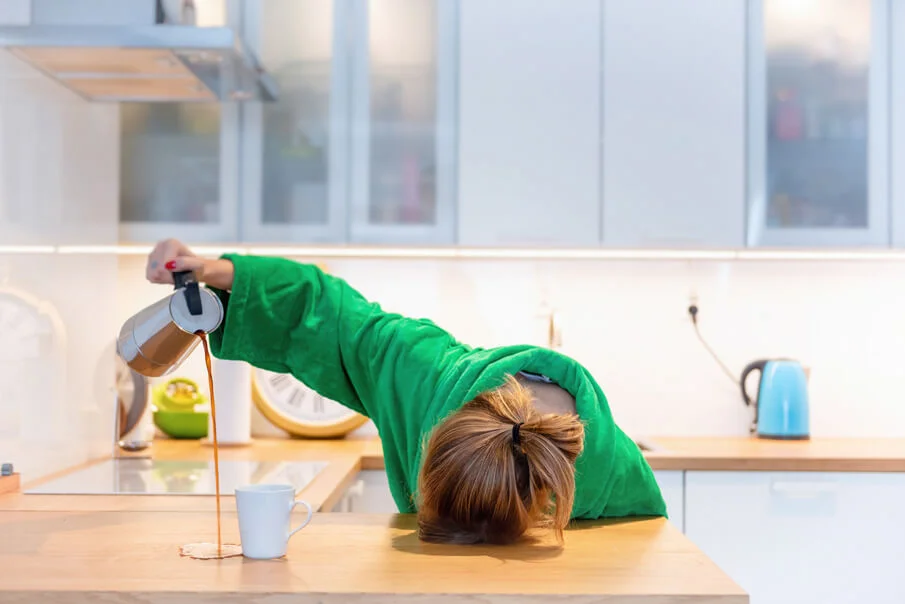
TIREDNESS: WHAT HELPS IF YOU ARE CONSTANTLY TIRED?
Reading time: 04:17 minutes
Table of contents
- What can cause constant tiredness?
- What can you do to combat exhaustion and tiredness?
- Practical wake-up tips
- When should you see a doctor about constant tiredness?
1. WHAT CAN BE THE CAUSES OF CONSTANT TIREDNESS?
According to a study, around 20 million people in Germany suffer from fatigue from time to time, almost four million even almost every day1. One in two schoolchildren also suffers from fatigue1. One of the most common causes of tiredness is a lack of sleep, which is often caused by problems falling asleep or excessive media consumption.
Too little exercise, fresh air and daylight are also often behind daytime sleepiness. An unbalanced diet can lead to a lack of important nutrients and make us feel tired. Digesting fatty food costs the body a lot of energy. If we drink too little, this can impair blood circulation and the brain does not get enough oxygen.
Constant stress at work, but also lack of challenge and boredom can make people feel tired all the time. Daytime tiredness can also be a side effect of certain medications, such as antihypertensives or antihistamines. In addition to these typical causes, there are also illnesses that can come into question:
- Mental illnesses such as burn-out syndrome, depression or anxiety disorders
- Chronic fatigue syndrome (CFS)
- Obesity, underweight or eating disorders
- Neurological diseases such as Parkinson's, dementia or multiple sclerosis
- Infectious diseases such as flu or colds
- Blood disorders such as anemia
- Low blood pressure
- Organic diseases of the heart, kidneys or liver
- Hormonal disorders such as hypothyroidism
- Diabetes
- Autoimmune diseases such as rheumatoid arthritis or lupus
- Allergies
- Cancers
2. WHAT CAN BE DONE TO COMBAT EXHAUSTION AND FATIGUE?
Constant tiredness can restrict us in everyday life and even put us in dangerous situations - in a British study, 29 percent of respondents said they had almost fallen asleep at the wheel at least once in the last year2. However, a change in sleeping or lifestyle habits can often help to overcome constant sleepiness. The following tips are suitable for this:
More exercise: Moderate endurance sports such as jogging, Nordic walking or cycling strengthen the cardiovascular system and the immune system and help to combat tiredness.
Less stress: People who are constantly tense and under pressure to perform sleep less well and are tired more often. Stress reduction, relaxation techniques and a balance of free time can help here.
Sleep hygiene: Good sleep hygiene improves the quality of sleep. Make sure you have fixed times for going to bed and getting up, a comfortable mattress and a bedroom temperature between 15 and 19 degrees. Ventilate the bedroom before going to bed and make sure it is quiet and dark at night. Earplugs and sleeping goggles can ensure peace and quiet and darkness. Sleep rituals such as reading or a cup of hot milk also help many people.
Regeneration phases: Make sure you take regular breaks during the day to rest or actively recover. For example, take a short walk or drink a cup of tea.
Balanced diet: A healthy diet ensures you get enough carbohydrates, proteins, fats as well as vitamins, minerals and trace elements. Instead of ready-made products, your diet should include plenty of fresh vegetables and fruit, pulses, nuts and whole grains.
Nutrients: In some cases, a nutrient deficiency is behind persistent tiredness - iron, magnesium and vitamin B12 are particularly relevant here. Special dietary supplements can compensate for nutrient deficiencies.
Daylight: Bright lighting, but especially natural daylight, suppresses the production of the sleep hormone melatonin. Instead, the production of serotonin is stimulated, which has a mood-enhancing and stimulating effect. So spend as much time as possible outdoors and ensure good lighting indoors.
Fresh air: Oxygen, as well as changing weather conditions, stimulate circulation and boost the immune system. Regular ventilation and exercise in the fresh air sometimes work wonders against tiredness.
3. PRACTICAL WAKE-UP TIPS
Power nap: Lie down for 20 minutes and take a nap - we often feel more rested afterwards.
Glass of water: Tiredness is often caused by a lack of fluids. With a glass of water, you can balance your fluid levels and stimulate blood circulation.
Eat a banana: Fructose provides quickly available energy. Bananas also contain valuable micronutrients such as magnesium, potassium and vitamin B3.
Cold shower: A cold shower stimulates the circulation. Alternatively, an alternating shower is also beneficial for blood circulation. If you don't have time to shower, you can wet your face and armpits with cold water at the sink.
Open the window: Oxygen is a great way to combat tiredness. Open the windows and air out the room for 10 minutes.
Energy kick: Special dietary supplements with caffeine and guarana provide a quick wake-up effect.
###PRODUCT###
4. WHEN SHOULD YOU SEE A DOCTOR ABOUT PERSISTENT TIREDNESS?
In most cases, persistent tiredness can be banished if the above measures are implemented. However, if the problems persist or even worsen, a doctor should be consulted. The same applies if performance is impaired in the long term or if fatigue is accompanied by other symptoms, for example
- increased temperature or fever
- nausea and vomiting
- dizziness
- increased thirst
- physical pain
- increased sweating
- loss of appetite or weight loss
- breathing difficulties
- depressive moods
CONCLUSION
Constant tiredness can often be traced back to a lack of sleep, an unhealthy lifestyle or too much stress. If you change your habits, you will have more energy. In particular, the focus should be on exercise, daylight, fresh air, a balanced diet with sufficient nutrients, drinking plenty of fluids and good sleep hygiene.
Sources:
1Study: Prevention Radar 2018 by DAK-Gesundheit, link:https://www.dak.de/dak/bundesthemen/fast-jeder-dritte-schueler-hat-schlafstoerungen-2090982.html#/
2Study: G. Maycock, Sleepiness and driving: the experience of UK car drivers, ADAC guide "Fatigue in road traffic".
